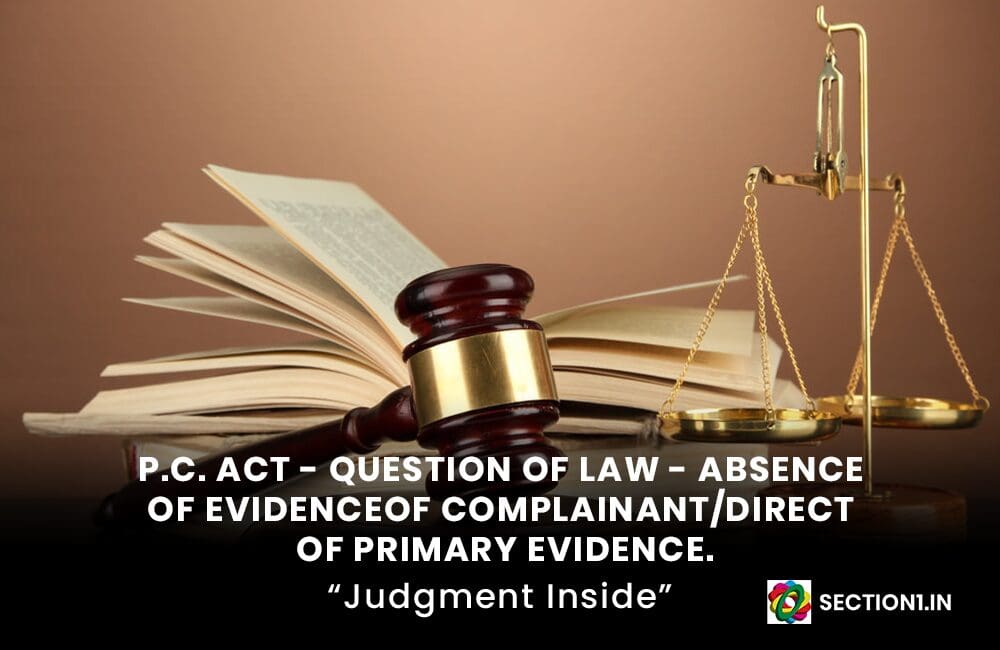QUESTION OF LAW INVOLVED IN THIS 5 JUDGE BENCH:
2. Thus, the moot question that arises for answering the reference is, in the absence of the complainant letting in direct evidence of demand owing to the non-availability of the complainant or owing to his death or other reason, whether the demand for illegal gratification could be established by other evidence. This is because in the absence of proof of demand, a legal presumption under Section 20 of the Prevention of Corruption Act, 1988 (for short ‘the Act’) would not arise. Thus, the proof of demand is a sine qua non for an offence to be established under Sections 7, 13(1)(d)(i) and (ii) of the Act and de hors the proof of demand the offence under the two sections cannot be brought home. Thus, mere acceptance of any amount allegedly by way of illegal gratification or recovery thereof in the absence of proof of demand would not be sufficient to bring home the charge under Sections 7, 13(1)(d)(i) and (ii) of the Act. Hence, the pertinent question is, as to how demand could be proved in the absence of any direct evidence being let in by the complainant owing to the complainant not supporting the complaint or turning “hostile” or the complainant not being available on account of his death or for any other reason. In this regard, it is necessary to discuss the relevant Sections of the Evidence Act before answering the question for reference.
xxx
70. Accordingly, the question referred for consideration of this Constitution Bench is answered as under:
In the absence of evidence of the complainant (direct/primary, oral/documentary evidence) it is permissible to draw an inferential deduction of culpability/guilt of a public servant under Section 7 and Section 13(1)(d) read with Section 13(2) of the Act based on other evidence adduced by the prosecution.
71. We direct that individual cases may be considered before the appropriate Bench after seeking orders of Hon’ble the Chief Justice of India.
Before we conclude, we hope and trust that the complainants as well as the prosecution make sincere efforts to ensure that the corrupt public servants are brought to book and convicted so that the administration and governance becomes unpolluted and free from corruption.
In this regard, we would like to reiterate what has been stated by this Court in Swatantar Singh vs. State of Haryana (1997) 4 SCC 14:
“6. ………..Corruption is corroding, like cancerous lymph nodes, the vital veins of the body politic, social fabric of efficiency in the public service and demoralising the honest officers. The efficiency in public service would improve only when the public servant devotes his sincere attention and does the duty diligently, truthfully, honestly and devotes himself assiduously to the performance of the duties of his post. The reputation of corruption would gather thick and unchaseable clouds around the conduct of the officer and gain notoriety much faster than the smoke”.
The above has been reiterated in A.B. Bhaskara Rao vs. CBI (2011) 10 SCC 259 by quoting as under from the case of State of M.P. vs. Shambhu Dayal (2006) 8 SCC 693:
“32. It is difficult to accept the prayer of the respondent that a lenient view be taken in this case. The corruption by public servants has become a gigantic problem. It has spread everywhere. No facet of public activity has been left unaffected by the stink of corruption. It has deep and pervasive impact on the functioning of the entire country. Large-scale corruption retards the nation-building activities and everyone has to suffer on that count.”
We place on record our appreciation of all learned senior counsel as well as counsel and instructing counsel including learned ASGs who have assisted the Court.
PARTY: NEERAJ DUTTA vs. STATE (GOVT. OF N.C.T. OF DELHI) – CRIMINAL APPEAL NO. 1669 OF 2009 – 15 DECEMBER, 2022.



